Best RAM for gaming in 2024: I've tested the best DDR4 and DDR5 RAM to find the right kits for you
I've put the top gaming memory through its paces to find out what the best RAM to pair with your new gaming PC is.
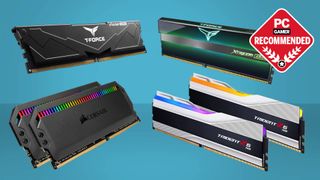
🐏 The list in brief
1. Best overall (DDR5)
2. Best budget (DDR5)
3. Best high-capacity (DDR5)
4. Best overall (DDR4)
5. Best budget (DDR4)
6. Best high-capacity (DDR4)
7. FAQ
8. Where to buy
9. Jargon buster
The best RAM for gaming is getting tougher to pick out, as we've seen a serious uptick in the number of kits available for the modern memory standard. Nevertheless, we're determined to find you the best around. We've put a bunch of DDR4 and DDR5 memory kits through their paces in the PC Gamer labs and handpicked the ones we think you should spend your hard-earned money on.
Our top pick for the best DDR5 RAM for gaming at the moment is the G.Skill Trident Z5 RGB, which delivers excellent performance for memory-hungry apps and games and is surprisingly affordable. If you're trying to save some cash for your next build, then our suggestion for the best budget DDR5 for gaming is the Team Group T-Force Vulcan.
If you have an older system or just one that still uses DDR4, then the best overall DDR4 memory is Team Group's Xtreem ARGB 16GB DDR4-3600 kit. But if you need more RAM than that, then the best DDR4 for high capacity has to be a set of Corsair's Dominator Platinum RGB. There really is a perfect RAM kit for every gaming PC out there.

Chris has tested more memory sticks than he'd like to admit. In fact, I think he secretly does it in his spare time, too. He's our resident memory expert, and has gone through the RAM gamut, testing speeds against latency, and capacity, and DDR4 vs. DDR5. The lot. That makes him perfectly placed to advise us all on what the best RAM is for our gaming rigs.
Quick List
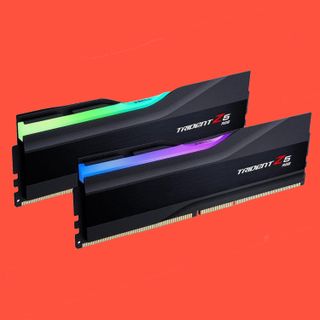
The best overall DDR5 kit
This G.Skill DDR5-7200 kit is ridiculously fast, but it's only relevant if you have an equally top-spec system to match it. But if you want the best around then G.Skill's combination of high frequency and low latency is it.
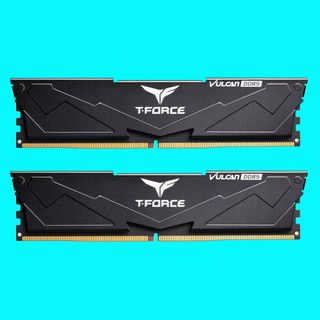
The best budget DDR5 kit
The DDR5-5200 Vulcan kit from Teamgroup isn't the fastest around, but it's a great option for those on a smaller budget. For the sake of a couple of bucks more than a base DDR4-4800 kit, it's well worth it. It's a hassle-free option that will work in any DDR5 system.
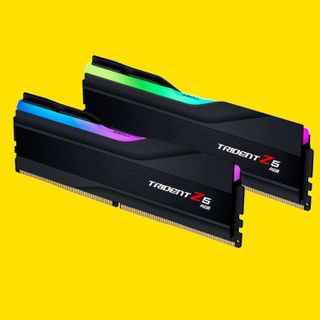
Best high-capacity DDR5 kit
2x32GB of memory isn't relevant for gaming at this point, but for those who use apps that love lots of RAM, this G.Skill kit is for you. Even if you don't make use of all that capacity, this is the kind of kit you'll be able to use for many years to come.
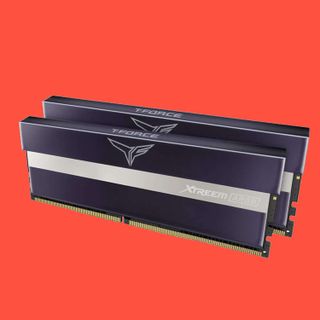
The best overall DDR4
DDR4-3600 is pretty much the sweet spot for a last-gen gaming PC, and the mixture of low latency, good looks, and solid price point makes the Xtreem memory kit a base for any system and a good upgrade, too.
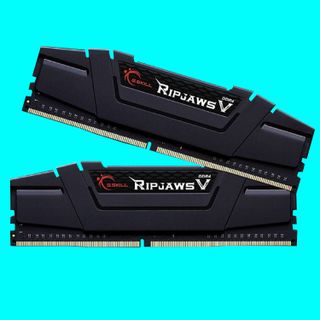
The best budget DDR4
Repeat after me: RAM doesn't need RGB. If you just want a solid set of pretty speedy DDR4 memory that isn't going to break the bank then G.Skill's well-priced Ripjaws V modules will be all the RAM your rig needs.
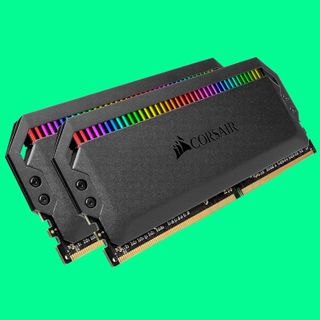
The best high-capacity DDR4
It has the looks, the speed, and the overclocking potential you could ever want. But most importantly of all, it's a big upgrade in memory capacity for your gaming PC.
Recent updates
This article was updated on April 16 to combine DDR4 and DDR5 recommendations into one easy-to-use guide, ensuring all of the top products we recommend are still valid choices in 2024.
Best overall DDR5





Specifications
Reasons to buy
Reasons to avoid
✅ You want high-speed and low-latency: The double whammy of a 7200 MHz speed and the CL34 rating means this is an affordable DDR5 kit that packs a real punch.
❌ You just want to install and forget: Relying on XMP settings above the 7000 MHz mark can be tricky, with motherboards not managing, and sometimes adding high voltages, which you'll need to tweak yourself.
The G.Skill Trident Z5 DDR5-7200 is the best overall DDR5 kit for gaming that you can buy, thanks to ultra-high speeds and super-low latencies. You'd expect memory at this level to cost a bundle, and at $299 / £319 / AU$519, it certainly carries a price premium, but it's not that bad. It's a downright bargain compared to the cost of premium DDR5 a year back, where prices of $500 / £500 / AU$1,000 or higher were commonplace.
G.Skill's dual channel DDR5-7200 kit has 34-45-45-115 timings. It's nice to see CAS latencies staying relatively low as speeds increase, though secondary timings are much higher than those you'll find on slower kits. Early complaints around the high latency of DDR5 compared to DDR4 are pretty much moot now.
This is a kit for those with high-end systems and not every system will be able to run it at its full speed. Trusting Intel XMP settings for speeds above 7000 MHz can be tricksy. Some motherboards will struggle to deal with automated settings and can add in rather ludicrous voltage settings which you'll need to wrestle back into normal realms manually.
And for those of you with an AMD AM5 gaming PC, you'll be far better off picking one of G.Skill's slower Trident Z5 Neo kits, as Zen 4 CPUs are more picky about what RAM they're paired with.
But the hell with it—we love fast memory kits. It's available to buy and delivers performance gains in more than a few gaming situations. It's also a great kit for tweakers and offers good looks, all without an exorbitant premium. If you buy this kit, you'll get several years of use out of it too.
Read our full G.Skill Trident Z5 RGB 2x16 GB DDR5-7200 CL34 review.
Best budget DDR5




2. Team Group T-Force Vulcan 32GB DDR5-5200
Our expert review:
Specifications
Reasons to buy
Reasons to avoid
✅ You want a reliable DDR5 kit that won't break the bank: At 5200MHz it's not the fastest, but this kit is also a decent step on from the original 4800MHz budget modules.
✅ You fancy dabbling in OC: Look, it's not an outright overclocking kit, but you ought to be able to get up to 5600MHz, and you could even squeeze 6000MHz out of it.
❌ You want the absolute cheapest DDR5: You can get cheaper 4800MHz kits, but for the extra $10 (possibly less) you're getting a kit that can deliver beyond a good DDR4 setup.
The Teamgroup T-Force Vulcan 2x16GB kit certainly isn't the fastest you'll come across but at $100 or less it's the best budget DDR5 for gaming right now. These days, there's little reason to fall back to a DDR5-4800 kit unless you absolutely must save every single dollar. For the sake of an extra 10 bucks or so (if that), it's well worth jumping up a speed tier to DDR5-5200.
It's the kind of kit that will match well with entry-level or mid-range systems, such as a B-series Intel or AMD motherboard, though any DDR5 supporting platform will run this kit with ease. Enabling XMP won't result in any issues, as 1.25 V is on the low voltage side compared to faster kits which can require 1.4 V or more.
It's worth noting that the DIMMs are a little taller than the most basic of kits at 32.7 mm but it shouldn't present you with any issues unless you are using the largest dual-tower air coolers.
Performance-wise, you'll hardly notice a difference compared to faster kits at twice the price, and even less so in gaming unless you're running a very fast card, in which case you probably wouldn't be using this kit anyway.
These days, with DDR5 prices dropping so much compared to a couple of years ago, it can be worth jumping up to DDR5-6000 if your budget allows. But, at the affordable end of the market, allocating a few extra dollars to a better CPU or GPU will deliver more tangible benefits than you'll see by moving up to faster RAM.
Best high-capacity DDR5



Specifications
Reasons to buy
Reasons to avoid
✅ You want to future-proof your PC: DDR6 is a long way off, and maybe even gaming PCs that need a ton of RAM, too, but if you want to buy a kit that will last a PC's lifetime, this 64GB set is certainly that.
✅ You run memory-hungry applications: If you're running productivity apps that devour RAM like so much candy, this affordable GSkill kit is a real boon.
❌ You're expecting 64GB to improve your frame rates: Gaming doesn't need 64GB of DDR5 memory, at least not yet. You won't get higher performance, but at 6400MHz you will at least ensure you don't need to upgrade your memory for a looooong time.
This G.Skill 2x32GB DDR5-6400 kit is the best high-capacity DDR5 RAM kit—fast with good timings, stylish looks, and mountains of gigabytes. It's well worth spending a few bucks over a 5200 MHz kit. It'll stand you in good stead in the future, with DDR5-6400 becoming JEDEC compliant, meaning it should become plug-and-play with future CPUs and platforms.
When it comes to gaming, there won't be a need for a 2x32GB DDR5 kit anytime soon, but if you use apps that thrive with capacious amounts of fast RAM, this G.Skill kit offers great value for money, good looks and high performance to go with its high capacity. The white Trident Z RGB version just begs to be shown off as part of a clean white-themed build!
Other than its usefulness in memory-gobbling creative and professional apps, lots of memory is beneficial for heavy multitasking. If you're the kind of user who runs a browser with 100 tabs open, streams, edits photos or videos and likes to game, then you can do all at the same time, and alt-tab between apps with little lag.
It's the kind of kit that will certainly last you for many years. With DDR6 a long way off, you'll be able to use it in lots of different PC builds in the future, so think of it as an investment. It's not like 16GB is hitting the wall right now, and 32GB won't be a problem anytime soon. But 64GB? You'll be set for at least a decade.
All things considered, weighing up whether to buy such a kit isn't so much a case of asking yourself if you need it, it's more a case of why not. Many years from now, you'll surely appreciate that extra capacity for a relatively small outlay over a lesser kit. As long as the rest of your system is up to par, that is. It remains the case that gamers will almost always benefit more from a GPU upgrade over a memory capacity upgrade.
Read our full G.Skill Trident Z5 DDR5-6400 CL32 review.
Best overall DDR4




Specifications
Reasons to buy
Reasons to avoid
✅ You want to give your gaming PC is bit more longevity: If you have an older or last-gen system, like AMD Zen 3, this RAM kit will keep it going for a good while yet.
✅ You like a subtle RGB design: Team has done a great job at making this kit look very classy, while still offering plenty of flashy LED lighting.
❌ You're expecting to overclock it: DDR4-3600 isn't the fastest last-gen RAM you can get and you won't be able to squeeze any more performance out of this kit.
This Team Xtreem ARGB kit is the best overall DDR4 for gaming, as it's not your standard DDR4 RAM—it’s one of the very few DDR4-3600 kits that come with a CAS latency of just 14. That puts it at the forefront of low-latency RAM favoured by gaming PCs, especially those that use AMD's AM4 socket.
DDR4 memory has matured nicely into old age. Just a couple of years ago, a decent DDR4-3200 kit was regarded as high-end, but as time ticks on, this speed is now the baseline for a decent gaming system. You could even argue that DDR4-3600 is the baseline for AMD Ryzen 5000 and Intel 12/13/14th Gen systems, for decent performance without any significant price premium.
That's great news for anyone with an AMD Zen 3 CPU, which favours a memory clock around the 3,600 MHz mark—thus ensuring the Infinity Fabric clock is kept at a 1:1 ratio with your memory and your chip ticking over happily with minimal latency penalties. A kit such as the Team Xtreem is pretty much optimal.
So, how does it perform? As is always the case with high-performance memory, the benefits are application-specific. When compared to a common DDR4-3200 kit you do get the odd bump, though any benefit is hidden when you move to higher resolutions and graphical details. You will see the benefits if you want to extract every last frame with a high refresh rate monitor.
If you want to eke out all your CPU has to offer and ensure your system looks fresh in the process, the Team Xtreem ARGB kit is a great option. Its DDR4-3600 speed and 14-15-15 timings offer a great blend of decent speed and low latency, without the steep price often associated with top-tier memory kits. Throw in the modules' appealing visual design and Team has a winner of a kit that deserves your consideration, particularly for older-gen AMD users.
Read our full Team Xtreem ARGB DDR4-3600 C14 review.
Best budget DDR4


5. G.Skill Ripjaws V 16GB DDR4-3600
Our expert review:
Specifications
Reasons to buy
Reasons to avoid
✅ You want great RAM at a great price: DDR4 is very reasonably priced these days but even so, this G.Skill kit is top value for money.
❌ You prefer a very understated look for your gaming PC: There's no RGB lighting to interfere with your rig's aesthetics but the design isn't exactly discrete in appearance.
The G.Skill Ripjaws V DDR4-3600 is a more mundane set of sticks for your PC, compared to some of our other recommendations, but that's why it's the best budget DDR4 for gaming. Sometimes you simply want to stuff your PC with some great value RAM and close it back up, never to be seen again. These Ripjaws are great for a capacity upgrade, or if you don't care much for flashing lights inside of your build.
This is a second-generation DDR4 kit from G.Skill and it's clear the company listened to the feedback and criticisms from the customers. The series is more affordable, faster, and has a less tacky heatsink than its predecessor.
You can expect superb performance out of this Ripjaws V kit and it will pair nicely with all of AMD's and Intel's DDR4 platforms—many of AMD's Ryzen 5000-series chips really benefit from higher-clocked RAM and depending on your system, you might be able to push it to more than 3600 MHz, with the right timings.
With a reasonable price, whether running stock or overclocked, G.Skill's Ripjaws V is hard to beat. Providing you don't care about RGB LEDs, of which there are none.
Best high-capacity DDR4



Specifications
Reasons to buy
Reasons to avoid
✅ You run memory-hungry applications: Lots of content creation apps use heaps of RAM. This kit will go a long way to satiate such demands.
❌ You want capacity, not flashiness: Classy RGB lighting and overclocking potential are a bit pointless if all you want is plenty of RAM.
Corsair has been producing great RAM for quite some time now and this Dominator Platinum RGB dual channel 32GB kit is the best high-capacity DDR4 you can buy. Its sleek exterior, patented DHX cooling technology, and unrivalled performance make it a formidable upgrade for anyone.
Few games really benefit from having 32GB in a gaming PC at the moment but this will change over time, so if you plan on keeping your DDR4 system for many years, then it makes sense to give it a decent amount now.
Like the rest of the RGB lineup, the Dominator Platinum RGB is controlled via Corsair's iCUE software suite. If you have any other Corsair RGB products, you'll be able to import and synchronize your lighting profiles across all devices. We had some issues mirroring our custom keyboard lighting profiles, but the 11 different predefined lighting link settings worked perfectly.
From a performance standpoint, the Dominator Platinum RGB lives up to its name. Each kit goes through a very tight screening process with hand-sorted memory chips to ensure maximum stability out of the box and generous overclocking headroom.
If you don't want flash or the overclocking headroom, you're probably better off buying something else, and the price may be a bit off-putting, too. But taking everything into account, we think it's worth every penny, especially if you like classy fast RAM with lots of capacity.
Read our full Corsair Dominator Platinum RGB review.
Best CPU for gaming | Best graphics card | Best gaming motherboards
Best SSD for gaming | Best PC cases | Best gaming monitors
DDR4 and DDR5-RAM FAQ
Does DDR5 RAM make a difference for gaming?
The answer depends on what speeds and latencies we're talking about. Games tend to be sensitive to latency, where lower is better. A good low-latency DDR4 kit is still a viable gaming option. However, the real-world performance differences are small and non-existent in GPU-limited scenarios, such as 4K gaming, which is usually the case unless you're chasing very high frames per second.
If you have a good DDR4 kit, let's say a 2x16GB DDR4-3200 C14 kit or better, there's little reason to spend the money to upgrade to DDR5 for gaming.
The higher bandwidth of DDR5 is beneficial in other areas though, particularly in creative-type applications. DDR5 uses less power, 32GB is generally the baseline, and a DDR5 system is better for future-proofing. As time goes on, we can expect faster and lower latency kits.
What platforms support DDR5 RAM?
When it all kicked off, DDR5 was entirely restricted to the Intel 12th Gen Alder Lake platform, but now we've got AMD's Ryzen 7000/8000-series Zen 4 processors and Intel's 13th Gen Raptor Lake and 14th Gen Raptor Lake Refresh series of CPUs all supporting DDR5.
Do note that in the case of Intel's chips, you need to choose the right motherboard if you want to go down the DDR5 route, as many come in DDR4 and DDR5 variants.
In contrast, AMD's Zen 4-based AM5 motherboards only support DDR5, so you don't need to worry about picking an incompatible motherboard.
What is the difference between DDR4 and DDR5?
The simple answer is: DDR5 is faster. Where the top DDR4 kits plateau around 5,000MHz, maybe a little quicker, DDR5 can run up to 8,000MHz and beyond. We've not yet seen the maximum of what DDR5 can achieve in terms of speed, but DDR4 has maxed out its potential.
DDR5 is not backwards compatible, even though it looks pretty similar, and you will need a DDR5-compatible CPU and motherboard to use it.
The other benefits to DDR5 are that it also runs more efficiently as a baseline, offers onboard power management, delivers higher die density for larger overall capacities, and has more XMP profiles, courtesy of XMP 3.0.
Will DDR5 work on a DDR4 motherboard?
No, it won't. Even though both types have 288 pins, DDR4 and DDR5 memory is electrically incompatible. The two types have a different notch positions, to prevent anyone from inserting a DDR5 module into a DDR4 motherboard, or vice versa.
How much RAM do I need?
We recommend a minimum of 16GB for most serious gaming PCs (it's what we use in our high-end PC build), but as 32GB DDR5 kits are so widely available, 32GB has become the new baseline for a DDR5 system. With 32GB, you'll have more than enough for pretty much every task you can throw at your system. You'll easily be able to enjoy gaming, multitasking, creative or intensive apps, and frequent alt-tabbing. And you'll be all set for a few years to come, too.
Some vendors now make 24GB DDR5 DIMMs and a dual channel kit means you could have up to 48GB in your gaming PC. Not that any game at the moment needs that much but if you use your PC for content creation, then it's potentially cheaper than going with a 2x32GB kit for 64GB in total.
How fast should RAM be for a gaming PC?
Firstly, you should use a dual-channel kit wherever possible. That goes for both DDR4 and DDR5 systems. This will ensure you're getting the most out of the best CPUs for gaming.
For an Intel system, a good kit around the DDR5-5200 range will be fine, while for a high-end system, you'll want something a little faster at DDR5-6000 or even DDR5-6400, if you really want to get every last drop of performance. If you're using DDR4, then DDR4-3200 or DDR4-3600 is the ideal choice; DDR4-4000 is pretty expensive and generally not worth the money.
The sweet spot for AMD's latest CPUs is DDR5-6000. You can go faster but you'll end up paying a lot more money for a very small gain in performance. With AM4 gaming PCs, a decent DDR4-3200 or DDR4-3600 is all you'll need.
Why do I see MHz and MT/s when referring to RAM speeds?
DDR stands for double data rate, which means technically your RAM doesn't run at its advertised speed in megahertz, but rather operates as if it was. For every clock (cycle), DDR RAM transfers data twice. Some people prefer to use megatransfers, or million transfers per second (MT/s) when talking about RAM speeds for this reason, as that's more accurate.
If you're a stickler for semantics, this matters. Otherwise it's basically fine and well-understood both ways.
Do I need RGB LEDs on my memory DIMMs?
No. Absolutely not. But RGB can make your machine look slightly cooler, and we all know PCs need to run cool.
Where to buy
Where are the best DDR5 for gaming deals?
In the US:
- Amazon - Savings on PC gaming components
- Walmart - Some good savings on RAM
- Best Buy - Decent deals on Corsair DDR4 and DDR5 RAM
- Staples - Discounts on memory for laptops and desktops
In the UK:
- Amazon - Savings on PC DDR4 and DDR5 memory
- Ebuyer - Great deals on PC gaming memory
- Overclockers - Big savings on Team, Kingston and Corsair RAM
- Scan - Hundreds of RAM models to choose from
Jargon buster - RAM terminology
DDR - Double Data Rate. All modern RAM sends and receives data at double the rate that the memory chips' clocks are running at. In the case of DDR5, it's four times the rate.
DIMMs - Dual In-Line Memory Module, the physical circuit board that holds the RAM chips that plug into the slots on your motherboard.
ECC Memory - Error-correcting Code Memory, RAM capable of automatically detecting and correcting errors on the fly, generally used in data-sensitive applications, like scientific work or banking. Typically only used and supported on servers and workstations, most desktop boards can run it as non-ECC.
EXPO - AMD's equivalent to Intel's XMP system (see below)
Frequency - The number of memory transfers that take place, per second. Measured in MHz or sometimes in MT/s (millions of transfers per second).
CL/CAS Latency - Column Access Strobe Latency is the delay between the memory controller requesting data from the RAM and the available data; the first number listed in a kit's timings. Smaller values equate to a snappier performance.
RDIMM - Registered DIMM. These are used in workstations and servers. They have extra circuitry to lower the electrical load on the CPU's memory controller and motherboard, allowing lots of DIMMs to be installed. They're seldom used in a desktop PC.
SO-DIMM - More compact DIMM slots are typically deployed in laptops, although these can also turn up on tiny machines.
Timings - How long, measured in memory clock cycles, it takes for the RAM to respond to an operation requested by the memory controller. Lower is generally better for performance but not all CPUs and motherboards support every timing possible.
UDIMM - Unregistered DIMM. Another name for the standard DIMMs that desktop PCs use.
XMP - eXtreme Memory Profile, instructions for the BIOS that tell it what frequency, timings, and voltage to access RAM at, a shortcut for overclocking without tinkering with each set individually. Officially for Intel platforms, many AMD boards readily support reading XMP data (though it may go by another name like A-XMP, EXPO, or DOHC).
PC Gamer Newsletter
Sign up to get the best content of the week, and great gaming deals, as picked by the editors.

Chris' gaming experiences go back to the mid-nineties when he conned his parents into buying an 'educational PC' that was conveniently overpowered to play Doom and Tie Fighter. He developed a love of extreme overclocking that destroyed his savings despite the cheaper hardware on offer via his job at a PC store. To afford more LN2 he began moonlighting as a reviewer for VR-Zone before jumping the fence to work for MSI Australia. Since then, he's gone back to journalism, enthusiastically reviewing the latest and greatest components for PC & Tech Authority, PC Powerplay and currently Australian Personal Computer magazine and PC Gamer. Chris still puts far too many hours into Borderlands 3, always striving to become a more efficient killer.
- Nick EvansonHardware Writer
Most Popular


